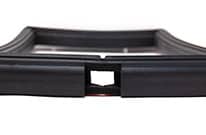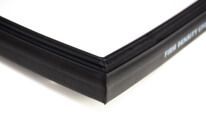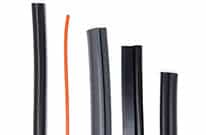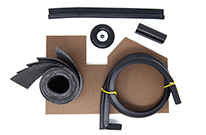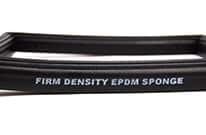John Rye
Branch Manager at Elasto Proxy
Food grade silicones are used in food processing facilities and industrial kitchens to help keep food items from coming into contact with equipment surfaces. Products include non-stick baking molds, pads, and trays; sanitary door seals for refrigerators, freezers, mixers, and ovens; and protective rubber profiles for the sharp edges on stainless steel surfaces such as food prep tables.
A type of synthetic rubber, silicone is an inert compound that will not react with food products or food ingredients. This flexible, durable synthetic material doesn’t off-gas fumes either. Suitable for high and low service temperatures, silicone seals can be used with both ovens and freezers. Applications for silicone extend beyond the food equipment industry, so suppliers use the term food grade silicones.
Not all food grade silicones contain the same ingredients, however, and silicone sponge and solid silicone have different material properties. There’s also the matter of meeting standards such as those from the National Sanitary Foundation (NSF) and the Food and Drug Administration (FDA). Although the FDA’s regulatory jurisdiction is limited to the United States, FDA standards are used worldwide.
Food Grade, FDA Compliant, or FDA Approved?
Many suppliers offer food grade silicones, but some describe their materials as “FDA compliant” or “FDA approved”. Typically, these compounds comply with only the FDA’s extraction requirement, or contain only a subset of ingredients that are FDA approved. In other words, these silicones are food grade, but they’re not fully FDA compliant – and they’re not fully FDA approved.
What does this matter? In an article entitled Is It Really FDA Approved?, the agency explains how and what it approves. Materials such as silicone, which were once known as indirect food additives, are now called food contact substances (FCS) instead. If an FCS contains multiple additives (as compounds do), then all of the additives must be approved in order for the FCS to be fully-approved.
Technical buyers also need to understand the FDA’s extraction limit. CFR 21.177.2600 specifies multiple extraction test limits for rubber that comes into contact with food. Using distilled water and n-hexane, suppliers must prove that their rubber does not exceed allowable extractive amounts. Yet meeting this standard alone doesn’t make a food grade silicone fully FDA approved.
A Silicone Sponge That Fills the Gap
As an experienced custom fabricator with expertise in compound selection, Elasto Proxy offers sealing solutions that are made from fully FDA approved silicone sponge. The sheets, rolls, and extrusions that we convert are made from a special silicone compound that meets the FDA’s extraction test, and also contains only FDA-approved additives.
Food and beverage equipment manufacturers, the pharmaceutical industry, and medical manufacturers now have a new option for meeting application requirements. Moreover, because this fully FDA approved silicone is a sponge, its features include excellent compression set and recovery. This is important not just for door seals, but also with baking mats where food products fall onto a packing line.
How Can We Help You?
Do you need help sourcing silicones for sanitary applications? For 25 years, Elasto Proxy has been working with partners in a variety of industries to solve sealing challenges. By listening to all of your requirements and analyzing all of your needs, our solutions providers can recommend silicone seals that are right for your application.
Please contact us for more information, or join the conversation on our social media channels. Look for a post with a link to this blog entry on LinkedIn, Facebook, Google+, and Twitter. Elasto Proxy has a YouTube channel, too. Finally, please subscribe to our free e-newsletters. They’re a great source of information delivered right to your email inbox, and they provide links to blog entries like this one.




